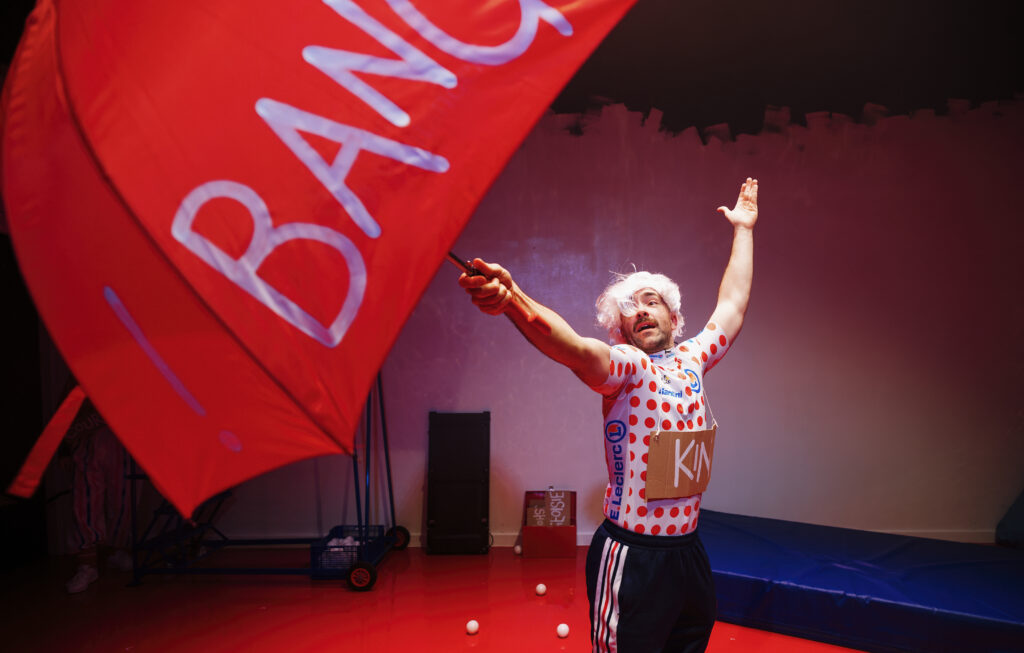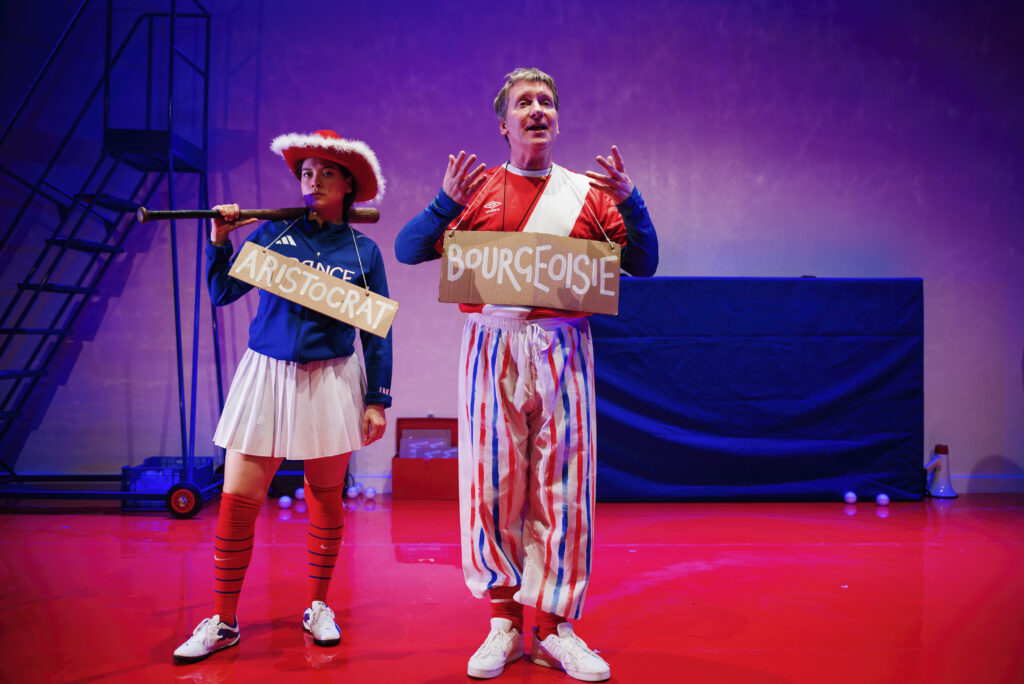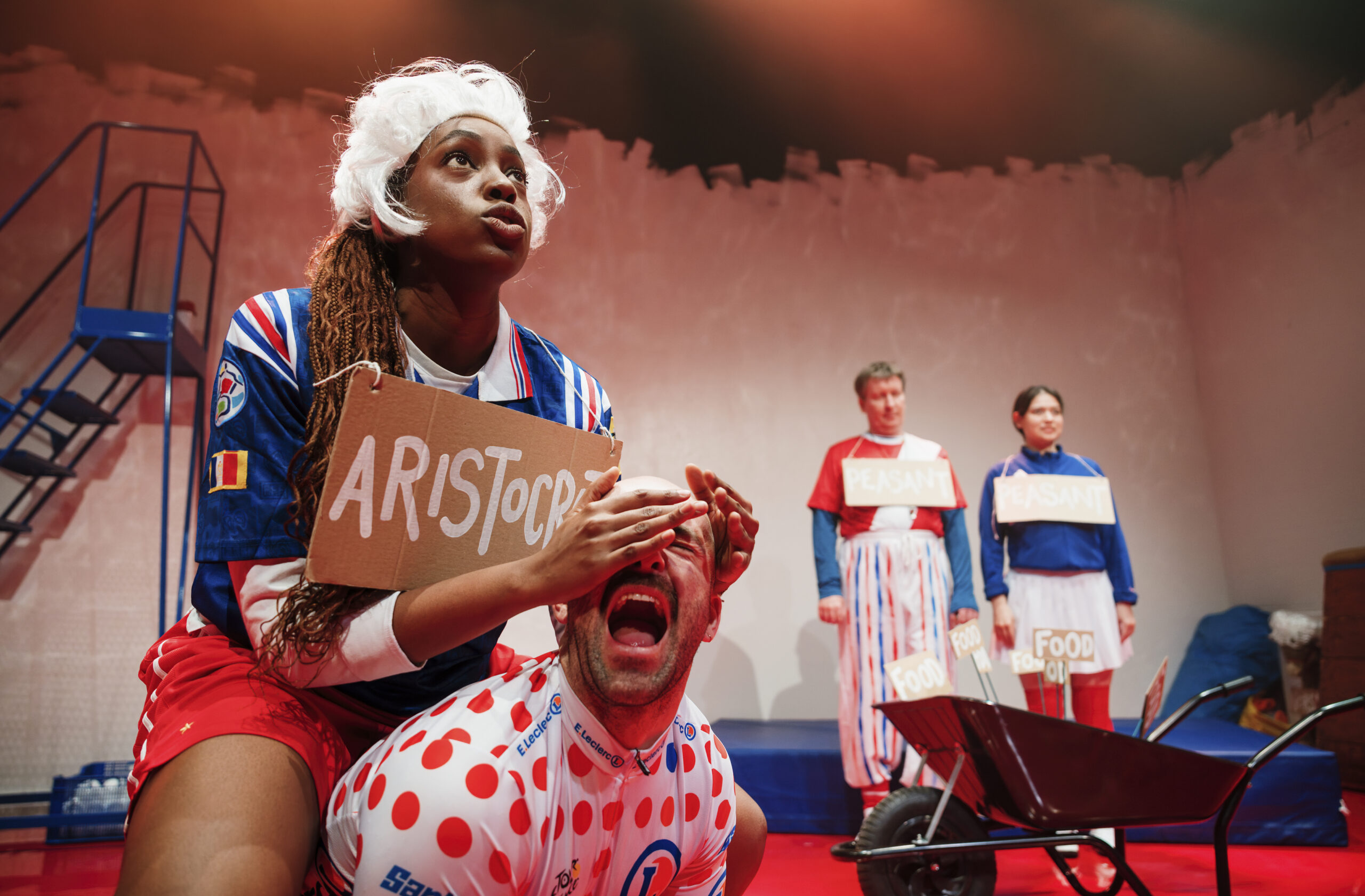The Glorious French Revolution (or: why sometimes it takes a guillotine to get anything done) – YESYESNONO / New Diorama Theatre, London
The Glorious French Revolution is part history lesson, part boundary-pushing and unexpected devised ensemble theatre.

The Glorious French Revolution
Now this is range. The last work I saw by YESYESNONO was small in scale, but covered billions of years and included a John Denver singalong. This one hones in on a few crucial years in French history: the French Revolution from inception to… well, the ending is a little more ambiguous. No singalong, but sit up front if you want the opportunity to pelt an aristocrat with plastic balls.
The Glorious French Revolution, like We Were Promised Honey, is written by Sam Ward. This time he directs but does not act. Instead we have five actors (Joe Boylan, Paul Brendan, Sha Dessi, Jessica Enemokwu, and Alice Keedwell) alternating a vast array of roles, from Louis XVI to generals, aristocrats, shoemakers and washerwomen. The history lesson has a lot of factually correct detail. It’s also fairly effective. The thing about the big moments in history is that they’ve happened. You can read about them in history books, but there’s an inevitability to them. What I found very impactful about this format is it returned the humanity to historic events. By which I mean the fallibility. The poor decision making, without the benefit of hindsight. The fact that none of it was inevitable but it happened anyway.
And happen it does, over the course of 90 minutes on the New Diorama stage. This is incredibly physical theatre, to the extent of having gymnastics equipment and a treadmill on stage. How the cast are doing this multiple times a week I don’t know. I would also categorise it as Expressionist theatre, meaning we’re not aiming for naturalism here. It’s silly and camp and over the top, but still has moments of great impact. In actual fact it’s perhaps more impactful, more sinister, to be blindsided by a first person description of being torn apart by an angry mob after a playful ‘storming the Bastille’ scene in the style of sports commentary.

Why Sometimes it Takes a Guillotine to Get Anything Done
As for what it’s all really about, if you assume the French Revolution is a way to comment on current issues, I think that should be fairly obvious. We, like the France of the 1780s, live in a time of enormous and growing inequality. The fact that the have-nots mostly have their most basic needs met (at least for now, and depending who you’re talking about) has staved off anything as drastic as a revolution so far. But how long will that continue to be the case as various crises deepen? Learn from history, is the message here. Ward spells out the most important lessons, including that those in power won’t go if they’re not pushed.
So as I’ve described, this is a fairly demanding work for its cast. Also sometimes for its audience: it is loud, and bright, and there’s a lot of information to take in. It’s a devised work, and also an ensemble piece: strong performances throughout which support the storytelling, even if there’s little in the way of character development.
I particularly liked the design and the movement direction. The movement (not credited, so I guess part of the devising between Ward and cast) is so exaggerated, formal and strange that it communicates to the audience as much as the script does. And, like I say, the cast hardly need a gym membership while they’re working on this. The set and costume design (Hazel Low) is part of the same expressionistic, exaggerated world. And the lighting design (Han Sayles) is beautiful and often unexpected, especially in its use of shadows. In fact this whole work is unexpected. And I say that as a frequent theatre-goer with a French and History degree who should know about these things.
Comfortable theatre it is not. But interesting theatre it certainly is. If you want to be ready for the next revolution, here is an excellent and entertaining primer.
Salterton Arts Review’s rating: 3.5/5
The Glorious French Revolution on until 14 December 2024 (alternative Christmas theatre, anyone?). More info and tickets here.
Trending
If you see this after your page is loaded completely, leafletJS files are missing.

